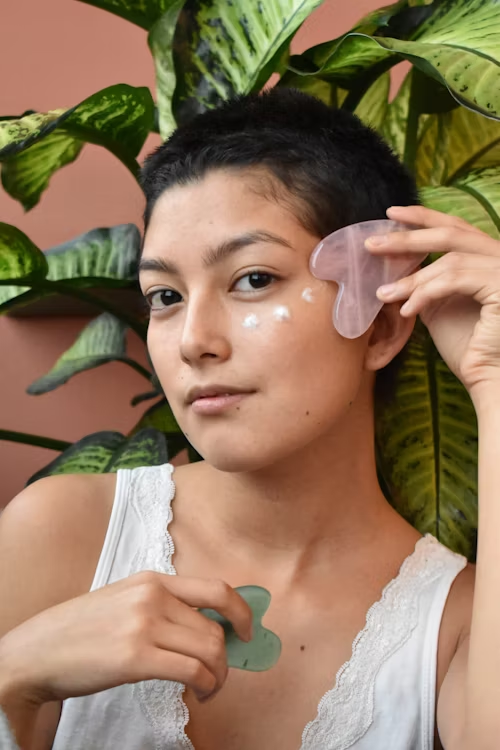Aging is a natural process, but it’s understandable to want to minimize its visible effects. If you’re eager to address signs of aging, incorporating specific skincare ingredients into your routine can be helpful. With various trendy ingredients in the beauty industry, it can be overwhelming to choose the right one for your needs. To simplify your decision-making, here are the top skincare ingredients for addressing aging skin that you should consider. Here are six potent skincare ingredients renowned for combating signs of aging effectively:
Best Anti-Aging Ingredient Tips: Top 6 Effective Formulas!
Hyaluronic Acid
Hyaluronic acid stands out as a widely favored skincare ingredient renowned for its efficacy. As we age, the levels of hyaluronic acid decrease, impacting skin hydration, moisture retention, and joint lubrication. Including hyaluronic acid in your skincare regimen provides multiple benefits. It helps to enhance skin texture, restore elasticity, reduce the visibility of wrinkles and fine lines, and promote a naturally radiant complexion.
By replenishing hyaluronic acid levels, skin is revitalized with increased hydration, which aids in maintaining a smoother and more supple texture. This ingredient’s ability to bind water molecules ensures that skin remains plump and youthful-looking. Additionally, hyaluronic acid’s hydrating properties contribute to a healthy glow, enhancing overall skin health and resilience against signs of aging.
Including hyaluronic acid in your daily skincare regimen can significantly improve skin appearance by addressing moisture retention and promoting a more youthful complexion. Its versatility in skincare formulations makes it a valuable asset for combatting the effects of aging and maintaining skin health over time.
Vitamin C
Vitamin C acts as a powerful antioxidant essential for shielding the skin against damage from environmental pollutants and chemicals. Recognized for its anti-aging properties, Vitamin C effectively enhances skin radiance by diminishing age spots, fine lines, and wrinkles. It supports collagen production, contributing to firmer and more resilient skin over time. Moreover, Vitamin C is a key component in sunscreens, offering enhanced protection against harmful UV rays, thereby helping to prevent premature aging and skin damage.
In skincare formulations, Vitamin C acts as a powerhouse ingredient that promotes a more even skin tone and reduces hyperpigmentation. Its ability to neutralize free radicals aids in maintaining skin health and vitality while also enhancing the skin’s natural glow and luminosity. Regular use of Vitamin C-infused products can visibly improve skin texture and brightness, ensuring a more youthful appearance and combating signs of aging effectively.
By incorporating Vitamin C into your skincare regimen, you can harness its protective and rejuvenating benefits. Whether in serums, creams, or sunscreens, Vitamin C offers versatile solutions to combat aging signs and protect against environmental stressors, contributing to healthier and more radiant skin.
Retinol
Retinol, a vitamin A derivative, is well-known for its capability to accelerate skin cell turnover, unclog pores, stimulate collagen synthesis, and promote exfoliation, resulting in a rejuvenated complexion. Widely incorporated into skincare formulations like creams, lotions, and serums, retinol plays a pivotal role in enhancing skin texture, imparting a revitalized and radiant appearance. Its potent anti-aging properties are particularly beneficial for reducing skin irritation, inflammation, and redness while effectively addressing acne concerns.
By promoting the renewal of skin cells, retinol helps in achieving a smoother and more even skin complexion, reducing the visibility of fine lines, wrinkles, and other signs of aging. Its exfoliating action helps to clear away dead skin cells, promoting a clearer complexion and improving overall skin health. Additionally, retinol’s collagen-boosting effects contribute to firmer and more elastic skin, restoring a youthful vitality that enhances skin resilience and reduces the visibility of imperfections.
Incorporating retinol into your skincare regimen can yield significant improvements in skin quality and appearance over time. Whether you’re targeting fine lines, acne scars, or uneven skin tone, retinol offers a multifaceted approach to skincare, delivering noticeable results that enhance skin radiance and promote a more youthful complexion.
Niacinamide
Niacinamide, a type of vitamin B3, is well-known for its anti-inflammatory and anti-aging qualities, making it a great choice for addressing signs of aging. It helps regulate skin tone and texture, reduces the appearance of fine lines and wrinkles, and enhances the skin’s barrier function. Particularly beneficial for individuals dealing with hyperpigmentation, skin irritation, inflammation, blemishes, adult acne, and redness associated with conditions like eczema, psoriasis, and rosacea, niacinamide is a versatile ingredient in skincare products.
By supporting the skin’s natural barrier, niacinamide helps to strengthen its resilience against environmental stressors and pollutants. This not only promotes a more even complexion but also contributes to overall skin health and vitality. Its capacity to regulate sebum production makes it ideal for oily and acne-prone skin types. At the same time, its anti-inflammatory properties soothe and calm irritated skin, promoting a clearer and smoother appearance.
Adding niacinamide to your skincare regimen can offer significant benefits, including improved skin texture, reduced hyperpigmentation, and a more youthful complexion. Whether used in serums, moisturizers, or other skincare formulations, niacinamide offers a comprehensive approach to achieving healthier, radiant skin by addressing multiple skin concerns effectively.
Peptides
Peptides are composed of amino acids and play a vital role in encouraging collagen production in the skin, which is vital for maintaining its youthful appearance and suppleness. As natural collagen production declines with age, incorporating skincare products enriched with peptides can effectively replenish and enhance collagen levels. This process enhances skin elasticity, firmness, and texture, promoting a youthful and radiant complexion.
Utilizing peptide-based skincare formulations over an extended period can yield significant benefits in combating visible signs of aging. By promoting collagen synthesis, peptides help diminish the clarity of fine lines, wrinkles, and skin sagging. They also contribute to boosting skin hydration and promoting a smoother, more even skin tone, making them a valuable addition to anti-aging skincare regimens.
Peptide-infused creams and serums are recommended for those seeking to achieve flawless and resilient skin over time. These products work synergistically with other skincare ingredients to provide comprehensive anti-aging benefits, addressing multiple skin concerns and promoting long-term skin health and vitality. Incorporating peptides into your daily skincare regimen can help maintain youthful-looking skin and enhance its natural beauty.
Ceramides
Ceramides are essential natural lipids found within skin cells, crucial for maintaining the skin’s protective barrier against environmental threats such as pollution and UV radiation. As we age, the levels of ceramides naturally decline, leading to increased skin dryness, sensitivity, and vulnerability to signs of aging. Incorporating skincare products containing ceramides can effectively replenish these lipid levels and fortify the skin’s barrier function.
By integrating ceramides into your skincare routine, you can help prevent and mitigate common signs of aging, including dryness, wrinkles, fine lines, and sagging skin. These lipid molecules work to enhance the skin’s moisture retention capabilities, promoting a smoother, more hydrated complexion. Ceramides also support overall skin health by maintaining optimal hydration levels and improving skin texture and resilience over time.
Utilizing ceramide-enriched skincare formulations is particularly beneficial for individuals seeking to address age-related skin concerns and maintain a youthful appearance. These products assist in reinforcing the skin’s natural barrier, minimizing moisture loss, and supporting a healthy skin barrier function. By restoring ceramide levels, skincare routines can effectively safeguard against environmental aggressors and promote long-term skin health and vitality.
Why does the skin change while aging?
As individuals age, their skin undergoes a series of natural transformations that reflect the cumulative effects of biological processes and external influences against environmental threats such as pollution and UV radiation collagen and elastin fibers within the skin’s dermal layer. Collagen provides structural support and elasticity, while elastin allows skin to stretch and recoil. As these proteins diminish with age, the skin loses its firmness and resilience, leading to the formation of fine lines, wrinkles, and sagging.
In addition to collagen and elastin depletion, aging also results in a decline in hyaluronic acid levels. Hyaluronic acid is a crucial molecule that attracts and retains moisture within the skin, playing a vital role in maintaining hydration and suppleness. As its production diminishes over time, the skin becomes more prone to dryness, contributing to a dull and rough texture.
Dermatologists, such as Dr. Rinky Kapoor, emphasize that these age-related changes vary from person to person but are generally characterized by a gradual thinning of the skin. This thinning occurs as the epidermis, the outer layer of the skin becomes less capable of retaining moisture and repairing itself. The result is skin that is more fragile and vulnerable to harm from environmental factors such as UV radiation and pollution.
Recognizing these natural processes underscores the importance of adopting a comprehensive skincare regimen that addresses the specific needs of aging skin. Incorporating products enriched with ingredients like retinoids to stimulate collagen production, hyaluronic acid to boost hydration, and antioxidants to protect against free radicals can help mitigate the visible signs of aging. Furthermore, practices such as regular sunscreen use, adequate hydration, along a nutritious diet abundant in antioxidants can complement skincare efforts in maintaining skin health and vitality over time.
Conclusion:
Anti-aging skincare ingredients like hyaluronic acid, vitamin C, retinol, niacinamide, peptides, and ceramides are essential for combating the visible effects of aging. These ingredients help to restore moisture, stimulate collagen production, and enhance skin texture, thereby minimizing the visibility of age spots, wrinkles, and fine lines. By incorporating these potent ingredients into a daily skincare routine, individuals can effectively maintain a youthful and radiant complexion while protecting their skin from environmental damage. Recognizing these benefits emphasizes the importance of selecting skincare products formulated for the specific requirements of aging skin.





